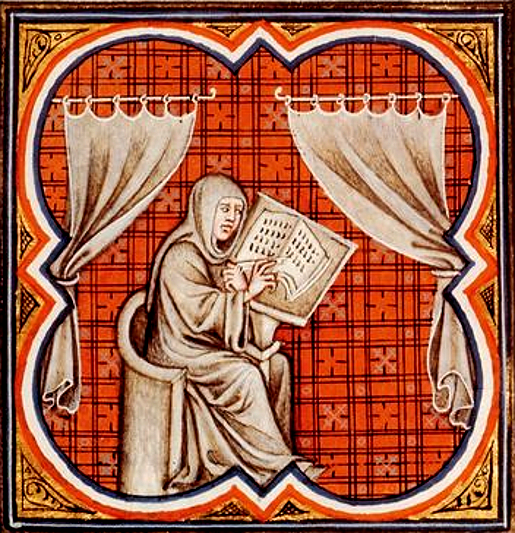Biographical Data in a Digital World 2022 (BD 2022) Workshop
Workshop co-located with the Digital Humanities 2022 (DH2022) conference on July 25th.

Einhard (775-840), medieval biographer of Charlemagne.
Call for Papers (Post-Proceedings)
A call for papers is open for the workshop participants to submit full papers on the topics of the workshop. The submissions will be peer reviewed and accepted papers will be included in the workshop proceedings that will be submitted to CEUR-WS.org for open online publication.
We solicit submissions in two forms: long papers (10–15 pages) and short papers (5–9 pages). The layout of the papers should follow the one-column CEURART style whose templates are available in LaTeX/Overleaf, docx and odt formats at http://ceur-ws.org/Vol-XXX/. The papers are submitted through OpenReview.
Deadline for submissions is September 21 October 19, 2022 at 23:59 (UTC).
Workshop Program
Monday, 25 July 20229:00-9:10 (UTC) Welcome & Introduction
9:10-10:20 Session 1: Network Analysis and Semantic Web
- The Hierarchical Structure of the Marriage Network of Noble Lineages in the Zhou Dynasty (Yuqi Chen)
- Computational Analysis of Holocaust Biographical data (Isuri Nanomi Arachchige, Tharindu Ranasinghe and Ruslan Mitkov)
- Biographical and Prosopographical Analyses of Finnish Academic People 1640–1899 Based on Linked Open Data (Petri Leskinen, Heikki Rantala and Eero Hyvönen)
- Extracting and Structuring Biographical Data for Social Network Analysis: The Approaches of the China Biographical Database (CBDB) (Song Chen)
- Creating and Using Biographical Dictionaries for Digital Humanities Based on Linked Data: A Survey of Web Services in Use in Finland (Eero Hyvönen)
- Discussion (10:00-10:20)
10:30-11:30 Session 2: Finding and Preparing Biographical Data for Research
- A Special Challenge in the Medieval and Early Modern Epigraphy – Annotation of Named Entities (Gregor Pobežin)
- "Mapping" biographies in relational databases - The case of Luxembourg soldiers in the Second World War (Nina Janz)
- The Promise of the Finding Aid: Finding Biographical Data in the Archive (Rachel Pierce)
FAIRifying Researcher-Curated Biographical Data in the 'Atlas of Holocaust Literature' (Marta Błaszczyńska and Bartłomiej Szleszyński)- Discussion (11:10-11:30)
11:40-12:50 Session 3: Use Cases and Advanced Ways of Working with Biographies
- The Life of Dante Alighieri and St Maximus the Greek (Neža Zajc)
- Mapping Biography and Influence: The Time-Layered Cultural Map of Australia (Paul Arthur and Isabel Smith)
- The Eastern and Western Entrepreneurial Heros’ Journey: A textual analysis of the emotional arc and narrative themes of biographies of Fortune 500 companies (Weiming Ye, Yi Luo and Debin Liu)
- Traveling with Albrecht Dürer - A Case Study for Uncertainty-Aware, Narrative Biography Visualization (Florian Windhager, Eva Mayr, Johannes Liem, Jakob Kusnick, Stefan Jänicke and Anja Grebe)
- Metadata may contribute to a multi-perspective view on biographies (Matthias Reinert and Team Deutsche Biographie)
- Discussion (12:30-12:50)
13:00-15:00 Interactive session for exchanging ideas, discussion, open challenges, and sharing resources
Call for Participation
Biographical and prosopographical data are invaluable sources for historical research as they provide us with essential information on thousands of historical figures: from the cultural heroes of a nation to the many thousands of other significant, yet lesser-known figures who were influential in domains such as the arts, politics, humanities, or natural sciences. Their historical life paths can provide crucial context for tangible heritage objects, which have been created, owned, or influenced by historical actors, or which depict or refer to them. The events of individual biographies can further be aggregated into (histories of) larger contextual composites: groups (e.g. guilds, family histories), institutions (e.g. art schools, universities, religious orders, political movements, companies) and regional entities (from cities to whole countries).
Computational analysis of biographies has opened up new and interesting research directions. Individuals share common characteristics that can be identified and used for information retrieval and data analysis, such as date of birth, occupation, social networks and places. Tools and approaches from the digital humanities can be used for both quantitative analyses of such data and for providing leads for more qualitative research questions.
This workshop has two main goals. First, previous events on biographical data and digital humanities have revealed that groups working in this domain have different strengths. Though many groups bring researchers from different domains together, some groups mainly consist of domain experts with a lot of knowledge of history, library studies or literature. Other teams are primarily made up of researchers specialized in automatic analysis, formal modeling or visualization. Bringing these groups together increases insights for both types of groups. Technical experts contribute insights on best practices to deal with typical challenges of the domain. Domain experts on what analyses they need, which potential technological challenges are problematic for their research questions and which are not. Second, there is keen interest in cross-national research on biographical information. Most resources are national resources and though many are open, sharing information also means understanding each other’s data representation, linking related information, etc.
Topics of interest include, but are not limited to:
- Digitizing and structuring biographical data
- Standards, vocabularies and best practices for processing biographical data
- Biographies and Linked Data
- Crowdsourcing biographical data
- Automatic biography generation
- Using biographical and prosopographical data for quantitative analyses
- Canonization of people and events in history
- Use of big data for biographical research
- Dealing with biographical data in heterogeneous datasets
- Creating and maintaining biographical dictionaries
- Enriching biographies from external sources
- Reconciling persons between biographical dictionaries
- Reconciling names against a biographical dictionary
- Visualizing biographical and prosopographical data
- Network analysis of biographical data
- Biographies and spatial analysis
- Biographies across countries and cultures
Submissions and Workshop Participation
We solicit submissions for the workshop as abstracts (500-1000 words). The submissions will be peer-reviewed, and the accepted submissions will be presented at the workshop (online). The submitted abstracts will not be published.
A separate call for full papers will be issued after the event for workshop participants, with proceedings that shall be submitted to CEUR-WS.org for online publication.
At least one author of each paper needs to register to the Digital Humanities 2022 conference in order to participate in the workshop. The workshop is organized online and is open for all conference participants.
Contributions can be submitted through EasyChair at https://easychair.org/conferences/?conf=bd2022.
Important Dates
- May 20: Deadline for submissions
- May 30: Notification of acceptance
- July 25: The workshop takes place
- August 11: Call for full papers announced
September 21October 19 (UTC): Deadline for full papers
Workshop Organizing Committee
- Mikko Koho, mikko.koho@aalto.fi, Aalto University
- Antske Fokkens, antske.fokkens@vu.nl, VU University Amsterdam and Eindhoven University of Technology
- Eveline Wandl-Vogt, Eveline.Wandl-Vogt@oeaw.ac.at, Ars Electronica Research Institute and Austrian Academy of Sciences
- Eero Hyvönen, eero.hyvonen@aalto.fi, Helsinki Centre for Digital Humanities (HELDIG) and Aalto University
- Richard Hadden, richard.hadden@oeaw.ac.at, Austrian Academy of Sciences
- Angel Daza, j.a.dazaarevalo@vu.nl, Vrije Universiteit Amsterdam
Workshop Programme Committee
- Mikko Koho, Aalto University, chair
- Eero Hyvönen, Aalto University and University of Helsinki (HELDIG), chair
- Eveline Wandl-Vogt, Ars Electronica Research Institute and Austrian Academy of Sciences, chair
- Paul Arthur, Edith Cowan University
- Angel Daza, Vrije Universiteit Amsterdam
- Thierry Declerck, German Research Center for Artificial Intelligence (DFKI)
- Antske Fokkens, VU University Amsterdam and Eindhoven University of Technology
- Richard Hadden, Austrian Academy of Sciences
- Petri Leskinen, University of Helsinki
- Rennie Mapp, University of Virginia
- Johannes Scholz, Graz University of Technology
- Lik Hang Tsui, City University of Hong Kong
- Jouni Tuominen, University of Helsinki and Aalto University
- Hongsu Wang, Harvard University
- David Joseph Wrisley, New York University Abu Dhabi and Princeton University
Registration
At least one author of each paper needs to register to the DH2022 conference in order to participate in the workshop. The workshop is open for all conference participants.


